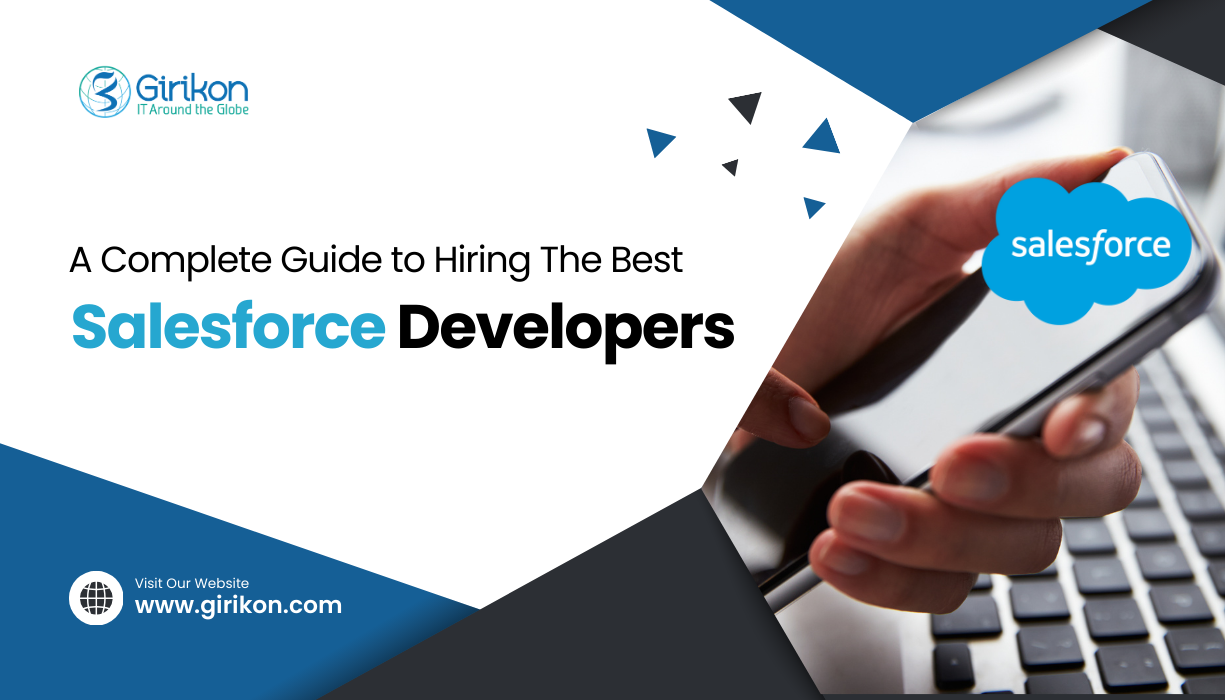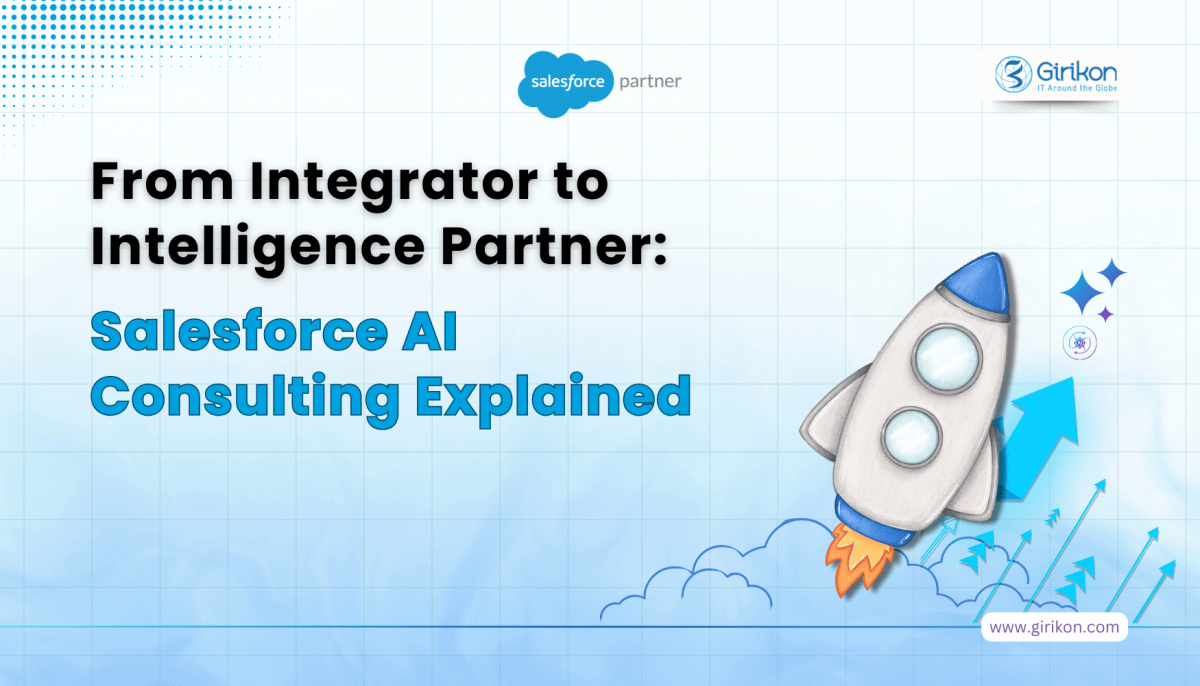Our Blogs
The growing demand for the world's leading CRM platform drives up demand for its associated skills. Salesforce implementation entails significant investment and its customization requires an investment in the right set of Salesforce developers

The key question is – How to find and recruit them?
In this blog we explain how to discover talent, what abilities to look for when recruiting a Salesforce developer, and more.
Growing Demand for Salesforce Developers
Factors Driving the Growing Demand for Salesforce Developers.
Digitalization Post-Pandemic
The Salesforce ecosystem expanded dramatically following the outbreak. This is owing to the complete digitization of most processes, including the use of cloud-based platforms like Salesforce. As a result, the demand for Salesforce developers as key members of a company's CRM department has skyrocketed.
Compensation
Attractive salaries offered to Salesforce developers attract more people to this role, increasing the number of people interested in entering this sector.
Innovation and Skill Upgradation
Salesforce upgrades its platform 3 times a year and in order to keep up, Salesforce developers must be abreast of the latest innovations.
Shortage of Skilled Professionals
While there may be a large number of individuals entering this sector, all of them may not have the requisite skills to succeed. Only people who hold relevant Salesforce credentials can be deemed as experts.
With only a handful falling into this group, there is a scarcity of experienced Salesforce development specialists. This resulted in an increase in demand for Salesforce developers.
Role of Salesforce Developers
Salesforce developers are specialists who leverage Salesforce technology to solve business problems. They are familiar with the Salesforce platform and can design tailored solutions based on the client's needs.
They first identify the gaps and issues in the current system and devise the best solutions to address them. After thoroughly understanding the business objectives, developers select the most effective low-code solutions offered by Salesforce technology.
Let's take a look at their responsibilities.
Responsibilities of Salesforce Developers
A Salesforce developer generally handles numerous tasks inside an organization.
Designing, Developing, and Maintaining Apps
The primary responsibility of Salesforce developers building and managing apps on the Salesforce platform tailored to the business needs of the organization.
Understanding Business Requirements
Salesforce developers collaborate closely with project stakeholders and users to better understand their needs and pain points. They tailor solutions to each customer's specific requirements.
Coding
They build solutions using multiple programming languages such as Apex, Lightning Components, and VisualForce on the Force.com platform. Furthermore, they work with web development languages such as HTML, JavaScript, and CSS.
Problem-Solving Skills
They have great problem-solving skills and can understand complex business problems to discover areas for improvement.
Communication
They work with technical or non-technical teams to provide on-call help for app concerns, such as debugging or augmented functionality. Assist users in clarifying their needs, providing information about alternate techniques, and outlining the potential consequences of process changes.
Quality Assurance
They are responsible for ensuring the quality of the solutions they develop. They ensure that any issues are fixed as soon as possible by performing various testing and debugging operations. Salesforce developers create, codify, and enforce app standards and practices to ensure consistency and efficiency.
Seamless Integration
They integrate multiple systems with Salesforce, including in-house as well as third-party apps and systems.
Salesforce Developer Hiring Options
Choosing the appropriate Salesforce developer is critical. However, to make an informed decision, it is vital to evaluate the various employment engagement options available:
Full-Time Salesforce Developers
As the name suggests, they are regular employees and work for your organization just like any other full-time employee.
Full-time employees are dedicated to your company, embrace its culture, and blend in. This provides them with the benefits of regular salary, paid time off, healthcare, insurance, and retirement benefits. Furthermore, depending on the requirements, they operate either in the office or remotely.
They are always available to address urgent issues and contribute to ongoing system enhancements.
When Should You Hire Full-Time Developers?
This depends on your business needs and the individual's skill set and experience. Hiring full-time developers allows you to collaborate with them whenever necessary, and make any necessary project updates quickly.
In-House Developers
They are the ones who are already an integral part of the organization. They work on projects in the same way that full-time developers do, except that they work from your office and not remotely. They receive all of the benefits of a full-time developer. Hiring in-house developers improves team collaboration because they are available on-premise.
When Should You Hire An In-House Developer?
Hiring an in-house developer has several benefits.
- You can use their experience and expertise.
- You can connect with them anytime during office hours.
- You have full control over the team and the project.
Remote Developers
They typically work from home or another location other than the office. Depending on project needs, they can be hired as contractual, full-time, or part-time developers.
When Should You Hire A Remote Developer?
- Free up the internal team's time and resources.
- Saves on hiring costs.
- When specific capabilities are unavailable locally.
Part-Time Developers
They are an excellent choice for firms with variable project demands or budget constraints. You can use their skills for certain tasks while optimizing resource allocation. They save both internal resources and the cost of employee benefits.
When Should You Hire A Part-Time Developer?
- When you require a developer quickly for a short period.
- When you don't want to incur costs on employee benefits
- When you don’t want to block coworking space
Contractual Developers
Contractual developers (sometimes also referred to as project-based developers) are engaged to work on specific projects or tasks. They are given specific deliverables and, on occasion, a time limit. This technique allows firms to gain access to specialist abilities without making a long-term commitment. It is an effective way to scale up your team based on project requirements. They might work full-time or part-time, depending on your business needs. Furthermore, they are appropriate for meeting short-term demands or completing specific projects or tasks.
When Should You Hire A Contractual Developer?
- If you have short-term project needs
- When you have clearly defined project objectives and schedules
- When you need additional skills for a project or task.
Hourly Developers
These developers are only compensated for the hours they work, making it an affordable choice for enterprises. They can be employed for brief periods of time and work on your tasks as needed without committing to a long-term contract.
When Should You Hire Hourly-Based Developers?
- When you have projects with varying workloads.
- When you need to scale up or downsize your teams at short notice.
The most suitable engagement is determined by your company's needs, project requirements, and budgetary constraints. Each option has its own advantages, allowing you to personalize your hiring strategy to meet your specific Salesforce development objectives.
Skills Required for Salesforce Developers
Look for developers with expertise in:
- Apex programming (including DML, batch processes, triggers, and test classes)
- Object-oriented programming (OOP)
- Salesforce Object Query Language (SOQL)
- Salesforce Object Search Language (SOSL)
- Lightning Web Components
- Lightning App Builder
- Salesforce DX
- Aura Framework
- Fuel API, REST, and SOAP APIs
- JavaScript, CSS, HTML
- Salesforce Flow
- Visualforce development
- Roles, profiles, sharing, and security configuration
- Salesforce data modeling
- Process Builder and Workflows
- Migration Tools
- Apex test case writing and execution
- Version control systems (Git)
- AMPscript (for Marketing Cloud integration)
- Salesforce Analytics Query Language (SAQL)
- SQL for Data Cloud
- Node.js, PHP, Python, Ruby, Java, Scala
Many Salesforce developers obtain Salesforce certifications to demonstrate their abilities. It is always a positive sign if a candidate has one.
Consider looking for these credentials:
- JavaScript Developer 1 Certification
- Platform App Builder Certification
- Platform Developer 1 Certification
- Platform Developer 2 Certification
While these are 4 primary areas of Salesforce expertise, you can also engage a Salesforce developer with certifications in other products.
B2C Commerce Developer
Skills in eCommerce development with expertise on the Salesforce B2C Commerce platform.
Marketing Cloud Developer
Skills in Marketing Cloud data modeling, data management, and automation.
Industries CPQ Developer
Expertise in CPQ (configure, price, quote) solutions for Communications, Media, and Energy & Utilities Cloud products.
OmniStudio Developer
Expertise in OmniStudio design, workflows, and dynamic UIs.
In addition, a Salesforce developer's resume can also be scanned for assessing basic soft skills. For example, you can look at how applicants characterize their previous projects, accomplishments, and roles. Contributions to Salesforce communities and events may demonstrate effective teamwork and learning skills. Mentoring experience is important if you wish to hire a Salesforce developer as a Team Lead or Tech Lead.
Thus, you can determine whether the developer is motivated to learn, possesses leadership abilities, and more. And lastly, when hiring Salesforce developers, make sure their language capabilities and time zone meet your team's requirements.
Conclusion
It is critical to remember that the success of your initiatives is greatly dependent on the kind of talent you bring to your team. Salesforce developers, with their knowledge in customer relationship management, have the potential to be the major driver of your company's success.
So, take action immediately, use these techniques, and start building your crack Salesforce team with a trusted Salesforce implementation partner. Collaborating with a team of certified Salesforce consultants will propel your company forward while providing exceptional customer-client experiences.

 +1-480-241-8198
+1-480-241-8198 +44-7428758945
+44-7428758945 +61-1300-332-888
+61-1300-332-888 +91 9811400594
+91 9811400594


















